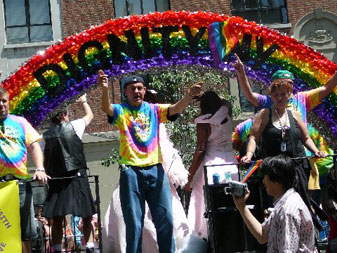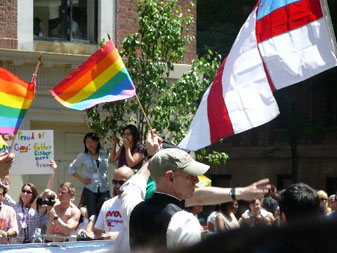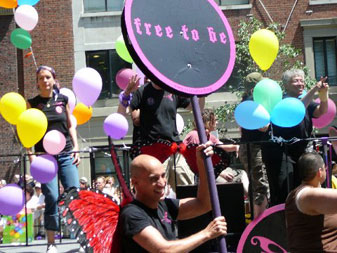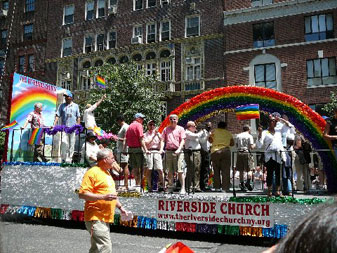Jesse Zink, a young man who grew up in our Episcopal parish, preached an amazing sermon today about his upcoming stint as a missionary in South Africa. Jesse will be working at the Itipini medical clinic in a shantytown outside Mthatha, which was the capital of the largest apartheid-era black “homeland” and is still one of the poorest parts of the country with one of the highest rates of HIV and tuberculosis. You can follow his progress (and make donations) at his blog Mthatha Mission.
In his sermon, he reflected on the mixed history of Christian missions and how the word “missionary” can be reclaimed for a less colonialist, more service-oriented way of living out the gospel in a foreign culture:
I read the Bible as a whole, a complete piece of divinely-inspired literature that – while contradictory and confusing in many places – tells a couple consistent messages throughout. The message I hear most frequently is evident in this morning’s Gospel. Jesus says, “one’s life does not consist in the abundance of one’s possessions” and warns those who “store up treasures for themselves but are not rich toward God.” We can summarize this message by paraphrasing what is often associated with a president: “Ask not what you can do for yourself; ask what you can do for God and God’s people.” God has created us, knows each one of us, and has blessed each of us with a unique set of gifts, not to enrich ourselves and store up treasures on earth but to enrich God’s fallen world and make it more like God’s perfect creation. That is no small task and not one that we accomplish in a day, a week, a month, a year, or even a lifetime. It is a task we shall never see the conclusion of. But it is a task to which we must devote our lives all the same.
Since we each have different gifts, we fulfill this godly duty in different ways, in a way that fully expresses the diversity of the Body of Christ metaphor Paul uses in his epistles. But we are united by one theme: service. I define service as the act of putting the needs of others ahead of the needs of oneself. We have our own desires and wishes, of course, and we shouldn’t deny them, but our orientation needs to be primarily outwards, towards our brothers and sisters in Christ, and not inwards, enriching only ourselves.
It is this attitude that has drawn me first to Nome, Alaska where for the past two years I have worked as a news reporter at a public-service radio station there, broadcasting to Alaska Natives in Western Alaska, who live in what are frequently termed “third-world conditions.” And it is an attitude that made me search for something like YASC. But when I found out that I would be a missionary of the church if I joined YASC, I paused. Why not stay in Nome or anywhere on this continent and continue to be a contributing member of society? Why not join some other secular service program, like the Peace Corps, which I seriously considered after college before opting for grad school? Why not run as far away from the dreaded m-word as possible? What theology of mission could I arrive at that would allow me to reconcile my belief in service with my hesitation at, say, the Great Commission?
…When Christian fervour for overseas mission work began to reach a critical mass in the early 19th century, the focus was on the “missions of the church,” that is, the hospitals, schools, and churches around the world that various parts of the church in the rich world supported. “Mission” is rooted in the Latin word that means “sent” so it made sense to focus on these discrete outposts of people who had been sent from their homes. While this is likely where the negative view of missionaries began, we should also recognize there were as many kinds of missionaries as there are kinds of Christians and many were kind and loving types who prayfully served their new communities.
Over time, however, this focus changed and people began speaking about the “Church’s mission.” The question became, What is the church doing all over the world and how can we all participate in that one mission? The Episcopal Church, for once in its life, was ahead of the game and in 1830 declared that every member of the church was a member of the Domestic and Foreign Missionary Society of the Protestant Episcopal Church of the United States of America, which remains our official title today and which means all of you are missionaries as well. Everyone participates in mission.
But focusing on the “Church’s mission” forgot an important element: God. So the focus in the last few decades has been on “God’s mission” and the question that is central to this is, What is the mission of God that the church and its members can participate in? The church is not the same all over the world, which is what the “Church’s mission” idea seemed to imply, but God’s mission is.
God’s mission is, and always has been, one of reconciliation, that is, bringing people to each other and bringing people to God. At Creation, God created Adam and Eve to be in relationship with each other and in relationship with their Creator. They, of course, fell away from that relationship, setting the model we continue to follow today. The reading for Hosea this morning is a reminder of the numerous times Israel fell away from God but also the equally numerous times God called those same sinful people into closer relationship with God, in the spirit of what Hosea calls God’s “warm and tender” compassion.
But God decided the work of reconciliation needed a human face and so took human form as Jesus Christ, who reached out to everyone but particularly the down-trodden, the outcast, and the forgotten and sought to bring them into loving relationship with their world and God. In the remainder of the New Testament, God’s message spreads beyond Israel as people are sent into the world to seek to reconcile our fallen world to God’s creation.
It is a testament to the challenge of this reconciling task that our mission is the same now as it was then: to do that work of reconciliation with the power of the Holy Spirit and the knowledge of Revelation and the Resurrection, that what is old can be made new again and that what is dead can be re-born. I’ll save my exegesis of the Great Commission for another time but it is this theology and this history that has made me comfortable with the idea that I am now a missionary. The point of performing this service mission in a religious context as opposed to a secular one is that it is rooted in and affirming of the faith that is the fundamental driving force behind the desire to serve….
Jesse’s sermon filled me with hope as an example of the Episcopal Church via media at its best: Public service not as a substitute for faith in Jesus, but as the natural and beautiful expression of that faith. Confession of Christ as Lord as the foundation for all we do, but not as a substitute for actually feeding his sheep. My prayers are with him.






